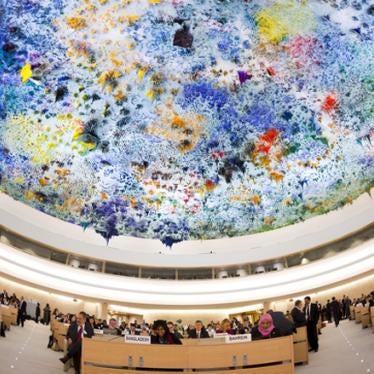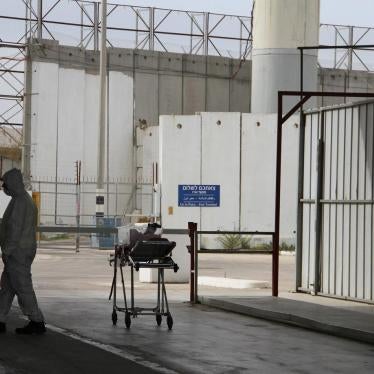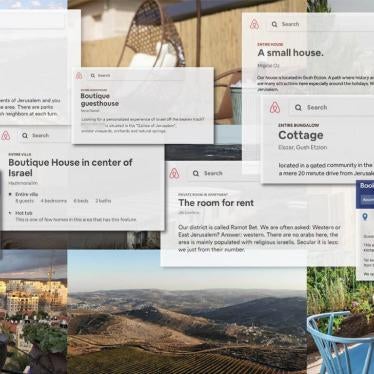Christoph Beumelburg
Director, Group Communication & Investor Relations
HeidelbergCement
Berliner Strasse 6
69120 Heidelberg, Germany
Re: Meeting Request Regarding Nahal Raba Quarry Expansion
Dear Mr. Beumelburg,
We are writing to request a meeting regarding apparent plans to expand the Nahal Raba quarry, located in the occupied West Bank on land confiscated by Israel in violation of international humanitarian law. The quarry is owned by Hanson, a subsidiary of HeidelbergCement.
Human Rights Watch previously had a productive engagement with your company regarding this quarry prior to and after the release of our report, Occupation, Inc., in January 2016.[1] The report included the quarry as one of five case studies highlighting how businesses with relationships to Israeli settlements unavoidably contribute to Israel’s violations of international humanitarian law and grave human rights abuses against Palestinians. Businesses operating in Israeli settlements depend on land unlawfully confiscated from Palestinians, and benefit from permits, infrastructure, and resources systematically denied to local Palestinians. They also pay taxes and often provide services that sustain settlements and operate within a two-tiered legal system where Palestinian and Israeli employees are governed under different bodies of law.
Prior to releasing the report, we sent a letter to Heidelberg raising our concerns regarding Nahal Raba quarry. That began a dialogue which culminated in our visit to Heidelberg, Germany, in January 2016. During that meeting, senior company staff informed us that Hanson was actively seeking to sell the quarry and considering a joint venture with the Palestinian Authority.
We were reassured to see media reports a few months after the meeting indicating that Heidelberg’s Chief Executive Bernd Scheifele announced at the company’s annual meeting that Hanson intended to sell the quarry.[2] We were also pleased that HeidelbergCement adopted its “Human Rights Position” in December 2017 that commits the company to respecting human rights, including the United Nations Guiding Principles on Business and Human Rights.[3] The position acknowledges the importance of applying this commitment “in the surroundings of our locations” and acknowledges “having a special responsibility toward our neighbors.”
We were therefore surprised to read in a report released last month co-written by Al Haq and SOMO that Hanson had in fact sought and received permission to expand its quarry operations by 98 dunams.[4] The report further alleges that the land in question is privately owned by Palestinians. Human Rights Watch research has shown that Israel’s designation of state land in the West Bank often includes privately owned land.[5]
Moreover, Human Rights Watch has seen new evidence indicating that Hanson continues to deliver building materials to settlements from Nahal Raba quarry, as well as to other facilities inside Israel. If true, this would deepen the company’s role in sustaining and expanding settlements. It also would contradict Heidelberg’s October 2017 statement, written in response to an article that appeared in Electronic Intifada, categorically stating that “Hanson Israel does not sell building materials to Israeli settlements in the West Bank or the construction of border protection systems.”[6]
In addition, Hanson continues to contribute to the sustainability of settlements by paying millions of dollars in taxes and royalties each year to the Samaria Regional Council and Israel’s Civil Administration.
In the same statement, Heidelberg, like certain other companies operating in settlements, pointed to the number of Palestinians who work at Nahal Raba Quarry in response to concerns about its operations. Employing Palestinian workers does not remedy businesses’ inevitable contribution to serious international humanitarian law violations and does little to mitigate the enormous harm that settlement-related Israeli policies cause to the Palestinian economy. Indeed, the cumulative impact of these policies effectively forces many Palestinians to work for businesses that contribute to abuses against them.
Settlements violate Article 49 of the Geneva Conventions, which prohibits an occupying power from transferring its civilian population into civilian territory, and constitute a war crime. The International Criminal Court is currently investigating the situation in Palestine and, in particular, Israel’s settlement enterprise. In addition to violating international humanitarian law, settlements are a central pillar of a discriminatory system that Israel operates in the West Bank that harms virtually all of Palestinians’ human rights.
In light of these developments, we kindly request a response to the below questions by Friday, June 5, as well as a remote meeting so that we may accurately reflect the company’s position in any public communication.
- Can you confirm how and why you are expanding the Nahal Raba quarry? How does expansion of this quarry align with the company’s human rights position?
- Can you confirm your continued sale or delivery of goods to Israeli settlements?
- Is Heidelberg seeking to sell Nahal Raba quarry? If so, what steps has it taken to do so?
- What amount of taxes, royalties, and other fees does HeidelbergCement, through its subsidiary Hanson Israel, pay annually to Israel for the extraction of resources and associated facilities in the occupied Palestinian territories?
- Is Heidelberg aware that Hanson has apparently continued to deliver building materials to Israeli settlements from Nahal Raba quarry and other facilities as recently as this year? How do such sales or deliveries align with the company’s human rights position?
- What steps has Heidelberg already taken, or plan to take, to stop deliveries on behalf of its subsidiaries to settlements?
We look forward to continuing the productive dialogue we began several years ago.
To arrange a meeting, please contact our colleague Namratha Somayajula at somayan@hrw.org.
Sincerely,
Arvind Ganesan
Director, Business and Human Rights
Human Rights Watch
Eric Goldstein
Director, Middle East and North Africa (Acting)
Human Rights Watch
[1] Human Rights Watch, Occupation, Inc.: How Settlement Businesses Contribute to Israel’s Violations of Palestinian Rights (New York: Human Rights Watch, 2016), https://www.hrw.org/report/2016/01/19/occupation-inc/how-settlement-businesses-contribute-israels-violations.
[2] Ilona Wissenbach, “HeidelbergCement Searching for New Site for West Bank Quarry,” Reuters, May 4, 2016, https://www.reuters.com/article/heidelbgcement-israel/heidelbergcement-searching-for-new-site-for-west-bank-quarry-idUSL5N1815HJ.
[3] “Responsible Management: Human Rights Position,” HeidelbergCement, December 7, 2017, https://www.heidelbergcement.com/en/responsible-management.
[4] Al-Haq and SOMO, Violations Set in Stone : HeidelbergCement in the Occupied Palestinian Territory, (Amsterdam/Ramallah, SOMO/Al-Haq, 2020), https://www.somo.nl/violations-set-in-stone/.
[5] Human Rights Watch, Occupation, Inc.; Human Rights Watch, Bed and Breakfast on Stolen Land: Tourist Rental Listings in West Bank Settlements (New York, Human Rights Watch, 2018), https://www.hrw.org/report/2018/11/20/bed-and-breakfast-stolen-land/tourist-rental-listings-west-bank-settlements.
[6] HeidelbergCement, “Response to the Article of Electronic Intifada” Business and Human Rights Resource Center, October 2, 2017, https://www.business-humanrights.org/en/opt-rights-groups-accuse-heidelbergcement-of-corporate-complicity-in-the-israeli-occupation-heidelbergcement-responds#c163294.








